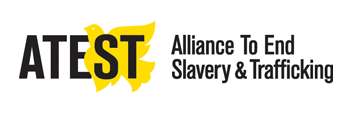MELYSA SPERBER | ALLIANCE TO END SLAVERY AND TRAFFICKING (ATEST)
Modern Day Slavery in our own Backyard
This year, the Oscar-nominated movie “12 Years A Slave” captured a shameful and painful chapter in America’s past. But did you know that today, as you read this, as many as 30 million people are enslaved worldwide, more than at any time in history.
As Melysa Sperber, Director of the Alliance to End Slavery and Trafficking (ATEST), told Congress recently, these modern day slaves are caught up in a 32-billion dollar industry that includes the sex trade and forced labor in hostile, sometimes life-threatening environments. Although the practice is most acute in Asia, this is not someone else’s problem. There are an estimated 14- to17-thousand trafficked workers right here in the United States. They are often young and frightened, sometimes physically, emotionally or verbally abused. They feel powerless and alone. Under Melysa’s leadership, ATEST is working hard to change that.
ATEST was convened in 2007 as part of Humanity United’s efforts to strengthen and foster coordination among the growing U.S-based anti-slavery movement. Melysa says ATEST believes that the voices of those who survive and escape human trafficking are critical in ending this criminal enslavement and finding policy solutions to human rights issues.
For Melysa, the seeds of social justice were planted in her from the earliest age by her parents who told her that her privileged life came with an obligation to help those suffering in the world. And in Hebrew School, where she was profoundly affected by the courage and resilience of Holocaust survivors who shared their stories.
Her commitment to the plight of others deepened with her first client as a new lawyer. It was a young, Cambodian woman who had been trafficked by U.S. citizens protected by diplomatic immunity. She was treated harshly by her employers, forced to work excessively long hours and endure prolonged isolation from family and friends. Despite such dehumanizing treatment, she survived and, ultimately, participated in the prosecution of her trafficker. Melysa says “It was her strength, not the exploitation she survived, that touched me deeply and compelled me to represent her zealously.”
And Melysa says she sees that resilience in other survivors of slavery and trafficking that she encounters today working with ATEST. Their indomitable spirit is what energizes her to pursue the organization’s stated mission: to strengthen the global anti-slavery advocacy moment, to engage private business to become part of the solution and to encourage sustained U.S. government leadership on the issue at home and abroad.
For Melysa, it is a call to action that she first heard in childhood and that has shaped the course of her life ever since.



